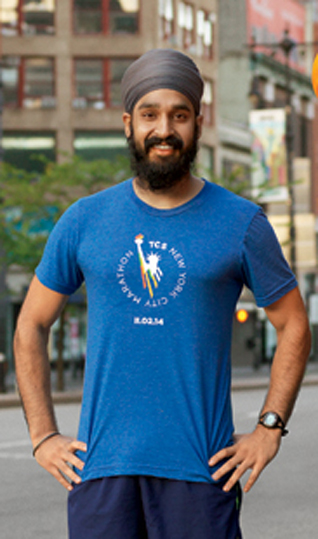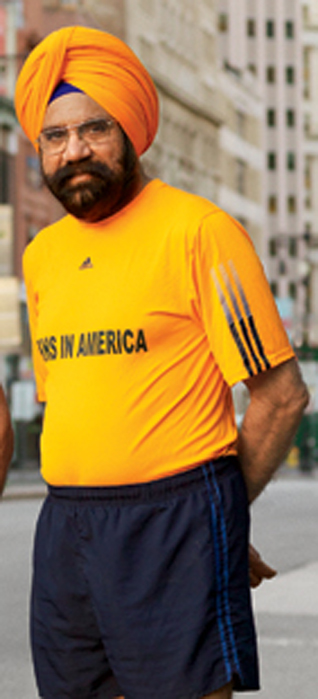Sports
Sikh-American Marathoners Follow Fauja Singh Footsteps:
New York Marathon on Sunday, Nov 2
JOHN HANC
Amid all the color and spectacle of New York City and its marathon are the Sikh-Americans-- a religious group whose adherents are identifiable by their beards and turbans (men) and steel bracelets (worn by both men and women).
An estimated 35 Sikh-Americans -- male and female -- are expected to make the 26.2-mile trek to Central Park from the Verrazano-Narrows Bridge on November 2, 2014.
Running and Sikhism, it seems, are a natural fit.
At the heart of the religion, which stems from Punjab, is the idea of sant-sipahi ("warrior-saint"), a person who strikes a balance in life in which the soul is cultivated and the body is kept strong.
"Sports and fitness are a centerpiece of our tradition," says Simran Jeet Singh, 30, a doctoral student in Columbia University's department of religion, who will be running his third NYC Marathon. "Sikhism also puts great emphasis on community service and philanthropy. Fund-raising is a part of the running culture, so our values align very nicely."
This year, Simran is running for the National Stroke Association and will also serve as a New York Road Runners social media reporter (he'll Tweet @SimranColumbia during the race).
Fauja Singh, a Sikh-Briton who became the oldest marathon finisher in history when he completed the Toronto Waterfront Marathon in 2011 at age 100, is credited for the boom. Think of him as Frank Shorter in a turban: Just as Shorter's victory in the 1972 Olympic Marathon prompted a generation of Americans to hit the roads, many Sikhs have followed in Fauja's footsteps.
SIMRAN'S RUNNING GROUP
Simran's running club (in Manhattan) now has 10 chapters nationwide. Simran, in fact, created a running club in the centenarian's honor in Manhattan in 2013. The Surat Fauj Running Club now has 10 chapters in various locations, including Boston, Chicago, Detroit, San Antonio, and San Francisco. The NYC-based club boasts 85 runners; the others average 20 members each.
While these clubs tend to attract a younger generation of Sikh runners, the community has its seasoned veterans. The elder in the New York City area is Avtar Singh Tinna, a 64-year-old dentist from Queens, who does Sunday long runs with a group of Sikh running pals. Avtar will run the NYC Marathon for the 23rd time this year, wearing his trademark orange racing shirt, with "Proud to Be Sikh" printed on the back.
When he first ran the race in 1992, a spectator shouted at him and asked if he was Ayatollah Khomeini, the infamous Iranian leader -- who was a Muslim, not a Sikh. "I guess he thought all guys with beards and turbans were Ayatollah Khomeini," Avtar says.
There are still misconceptions and even acts of violence against Sikhs: In September 2013, a Columbia University professor, who was also a member of the Fauj Running Club, was assaulted in an attack that was classified as a hate crime.
Fortunately, such bigotry doesn't extend into the sport, where the Sikhs say they feel welcome.
"In our religion a lot of attention is placed on building a community of like-minded people," Simran says. "That's one of the beautiful things about running. Runners have created this larger community of people with a shared passion and purpose, and it's exciting that we're now part of it."
[Courtesy: Runner’s World. Edited for sikhchic.com]
October 30, 2014
Conversation about this article
1: Harinder Singh (Punjab), October 30, 2014, 12:13 PM.
Sikh-American runners are Balley Balley!
2: Baldev Singh (Bradford, United Kingdom), October 30, 2014, 8:08 PM.
This is a great way to show what Sikhs and Sikhism are all about without having to say a word!




